Predicting the volumes and prices of fruits and vegetables through Artificial Intelligence (AI), that is what Amsterdam-based startup Merqato stands for. "We transform data from fruit and vegetable companies in combination with external data - such as information on the weather, energy prices, and trade data - into more accurate forecasts to create a better match between supply and demand," says Jan-Willem Snoeker, who founded the company in 2023 with Claire Bénard and Thomas Beelaerts.
They now work with two Dutch, a Spanish, and a German fruit and vegetable entity. Merqato assists these clients by generating reliable and long-term predictions of supply and demand. In this process, subscribers gain insights into both volume and price. This means, for instance, that a company can know one to four weeks in advance what the expected selling price will be, thereby making a better decision.
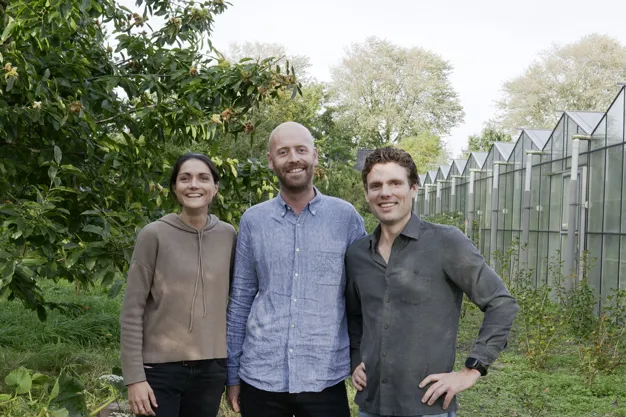
20% more accuracy
Moreover, the predictions for the expected volume of supply and demand lead to better chain alignment, resulting in lower operational costs and less waste. "This predictive model is a whopping 25% more accurate than the companies' own predictions." This gives users the opportunity to make cost-effective, data-driven decisions, which also leads to less product value loss. "This waste is not always recognized in the market, but when a product finds its way for a lower value, that's also a form of waste," says Jan-Willem.
Merqato started with a model for the products strawberries, tomatoes, grapes, and green beans. "Each product group has its own dynamics, whether it's grown in a greenhouse, open field, in Western Europe, or North Africa. These are all products that are sold within a few weeks of harvest. Ultimately, we also want to expand to other product groups, but we first want to further develop our model for these products."
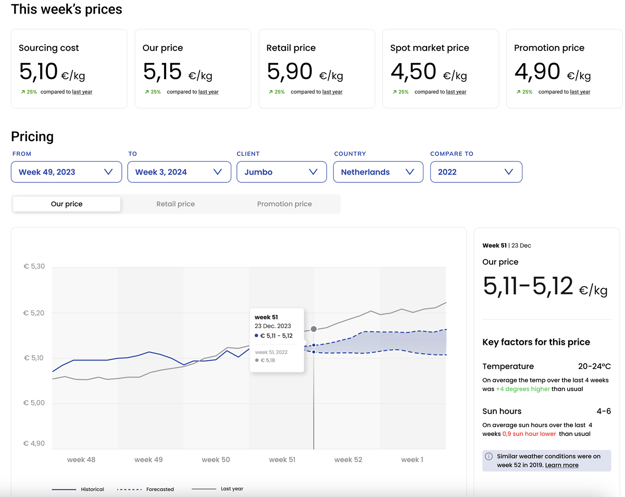
Reducing food waste
"We are seeing that the fruit and vegetable market is currently very production-driven, which inherently leads to surpluses. Thanks to our data technology, we provide companies with a more accurate insight into the volumes they can expect in a given week while also predicting the sourcing costs. Knowing six weeks in advance that you can expect a surplus allows you to look for alternative sales opportunities at an earlier stage. This reduces food waste in the market and helps cooperatives and wholesalers operating on low margins improve their profitability."
Initially, Merqato focuses on the predictive algorithm of volumes and prices. In a later phase, the startup also wants to apply its data technology in cultivation planning. "We started with price predictions, but later, it turned out that volume predictions were even more important for our customers. "Having a clear view of your expected product availability means you know what your customers can potentially purchase from you."
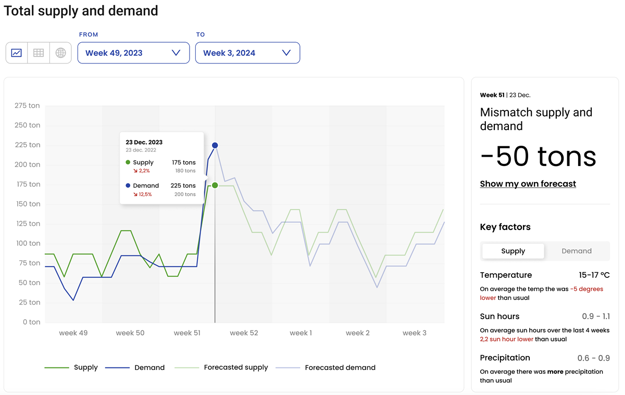
How does it work exactly?
"We have learned that it's important to quickly demonstrate the value of our product. That's why we've developed a platform that acts as a smart layer on existing IT systems, providing better predictions via an online dashboard within a week. We often get asked about the data sources we use, or people are hesitant to share data. The data sources we use vary by product, and our platform automatically ranks which factors are most relevant. This gives our customers quick access to a vast database of predictive factors. Customer data is never shared beyond that and will only used to make our predictions as accurate as possible."
Assisting wholesalers and cooperatives
Merqato primarily aims to assist wholesalers and cooperatives. "There's certainly a case to be made for offering our models to retailers as well, but they are already much more advanced with data. We find it particularly rewarding to help wholesalers and cooperatives strengthen their negotiating position through data. Thanks to algorithms, cooperatives and wholesale companies can lower their operational costs and create more value."
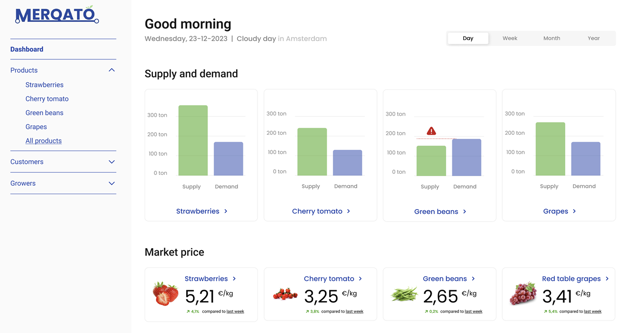
When asked about the biggest challenges, Jan-Willem replies: "A challenge is to attract more talent to us and to get investors with the right knowledge and skills on board to help us move forward. We previously received a convertible loan of €350,000 from the North Holland Innovation Fund. That was a nice boost to make the fruit and vegetable sector more effective and sustainable with data."
"But the biggest challenge is to get more partners on board who want to work with us to further develop and improve the model. We are still in the early stages of our company, and that comes with growing pains. The feedback we get from our customers is incredibly valuable. You're never fully developed, but I do expect us to be a European player within a few years. Our start in the Netherlands, Germany, and Spain is a great introduction to this. We notice that some companies are reserved about sharing data, but we challenge them to do a pilot. Then they'll experience for themselves the valuable insights our model can offer!"
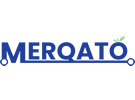 For more information:
For more information:
Jan-Willem Snoeker
Merqato
Mob.: +31614486078
Email: jan-willem@merqato.eu
www.merqato.eu
